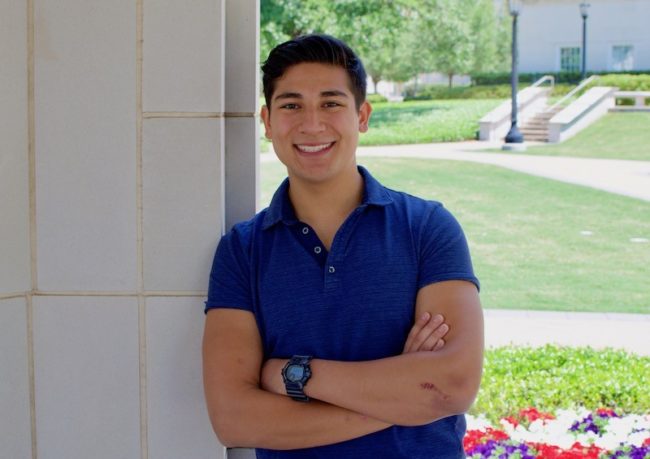Nathan DeVera is a busy man.
The rising senior is the president and team captain for the rugby club, the student body vice president and president of Southern Gentlemen, SMU’s male a cappella group. He is also a student ambassador who leads tour groups on campus.
“I was just doing whatever makes me happy,” DeVera said. “People ask me, ‘Why are you so involved in all these things?’ I just enjoy them.”
Now, DeVera gets to add a new title to his name. In early April, he was elected SMU’s new student body president. He took office just a few short weeks ago and has already started to build the foundations for his major policy proposals.
In a way, DeVera is a reflection of what he wants to build at SMU as someone who has become very involved there, transcending barriers and stereotypes along the way.
“I want to see an SMU where everyone is just living,” DeVera says. “There’s no worry about someone being a Meadows student or being a Cox student. Everyone supports everyone. People are saying, ‘We’re both Mustangs.’”
DeVera admits achieving such unity at a campus so involved with Greek life will be difficult, but he’s got an idea. He wants to see the school implement a master calendar, listing everything from club meetings to athletic events, that is accessible to every student.
The school currently lacks such a tool. All that information is spread across several different emails across several different calendars and schools. DeVera knows getting involved on campus is difficult when you don’t even know where to look to begin with, and he wants to change that.
DeVera thinks doing so will increase student participation on campus. More students will be at athletic events and club meetings. Freshmen will be able to find their niche, just as he did.
“It would really unify campus,” DeVera said. “It would make people more aware. [They’d look at it and say] ‘This club sounds cool. I didn’t even know it existed.’ You can get people more involved on campus that way.”
DeVera also thinks student involvement should go up the chain, all the way to the administration. He said he wants to “amplify the student voice” and that students should have a say in what their university is doing. Their voices should be heard by the administration, and they should have the ability to create change on campus, DeVera said.
In order to achieve this, DeVera plans to create “student advisory boards” that meet with key administrators at least once a month to make recommendations. Some have already been created, but DeVera thinks there’s room for more.
“Having students in meetings with key administrators is really pivotal in making sure that student voices are heard,” DeVera said. “[The administration] wants to make sure our student experience is great, but that can be difficult when they aren’t in the same meetings as students.”
DeVera has also set his sights on the quality of SMU’s facilities. It hasn’t been a good year for the school in that regard, but DeVera thinks that by meeting with administrators, students can force the school to make improvements that help better their lives on campus. That could mean better lighting on campus or upgrades to older dorms. DeVera wants to make sure campus facilities help foster a great learning environment.
DeVera is leading an effort to renovate Hughes-Trigg Student Center. At other schools, the student center is a place where students can come together and where they hang out. On the hilltop, it’s the opposite. It’s a place that is seldom used by students. The center is old and outdated, and DeVera doesn’t think it has to be that way.
“We need it to be like another Fondren,” DeVera said.
Renovating Hughes-Trigg has been discussed for a while. The last two student body presidents both toyed with the idea, but nothing came out of it. DeVera has taken a special interest in it, making it his pet project. The senate has already set aside $750,000 for renovation and is currently looking for donor money to bring those efforts to fruition. When DeVera looks into the future, he sees a building that’s modern with an open interior that fosters communication.
“It’s about open space but functional usage as well,” DeVera said.
Ultimately, DeVera just wants to do his best to make sure the school is operating at its full potential. He knows it might not happen while he’s on campus, but that doesn’t matter. He wants to be the trailblazer, the one that got it all started. He wants to be the one who sets everything into motion.
“I’m just trying to continue what people started in the past, and following through with it,” DeVera said. “Students are the reason why the school is here, but after four years, we are gone. If you can set the stage for the future, then that’s when you are going to have real change.”









